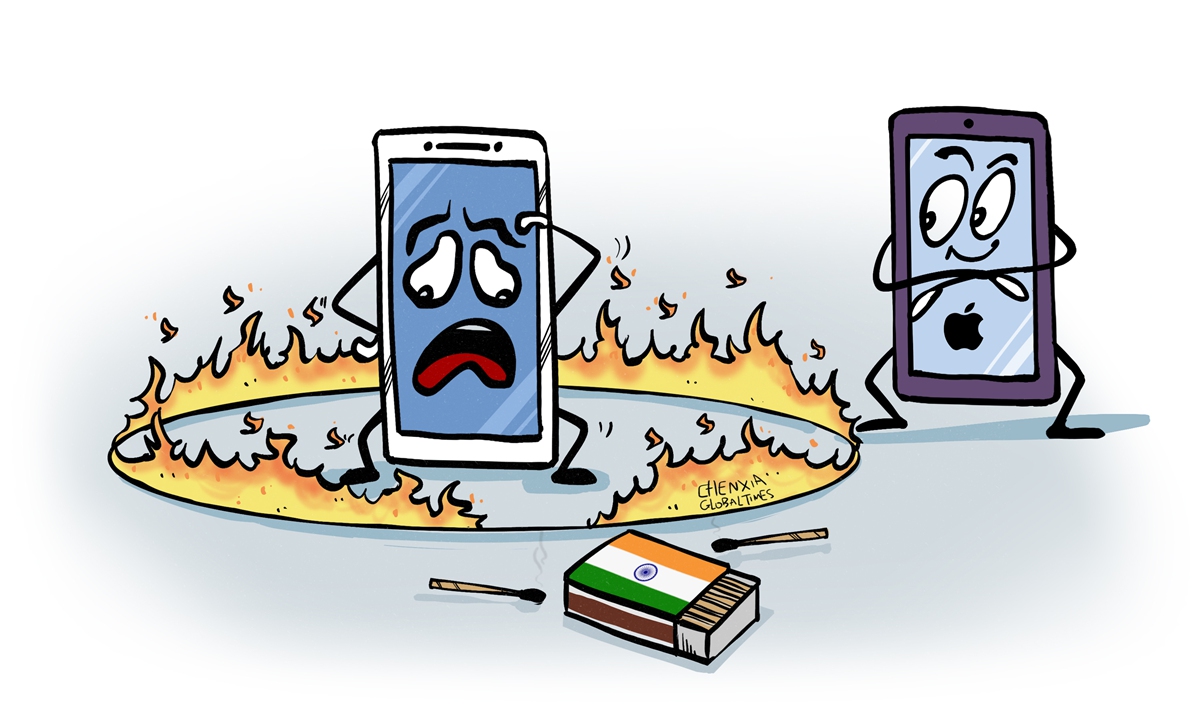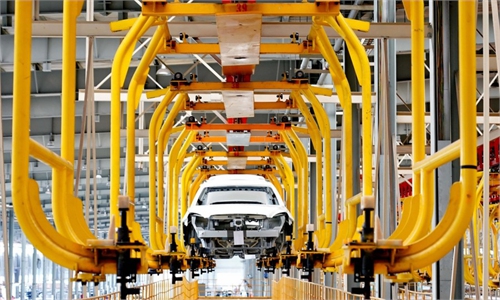
Illustration: Chen Xia/Global Times
Apple CEO Tim Cook was in Mumbai on Tuesday to inaugurate his company's first retail store in India. Cook's high-profile visit adds to evidence that India has become a new strategic focus for the iPhone maker.Apple's effort to deepen its retail push in India came almost at the same time as the WTO on Monday upheld EU claims against India and found that India's tariffs on certain information and communication technology (ICT) products, such as mobile phones, were not in line with its WTO commitments, and thus are illegal.
India has since 2014 gradually introduced customs duties of up to 20 percent on products such as mobile phones, mobile phone components and accessories, and an array of other technology products.
India should immediately abolish illegal tariffs on those ICT products so as to build an open and fair business environment for global investors, and if India does so, the spirit of free trade will make India's smartphone market more prosperous.
India is now the world's second-largest smartphone market, following China, which tops the list. Some statistics suggest India, with a population of about 1.4 billion, currently has more than 600 million smartphone users, a number that is expected to grow over time as future phone users migrate to smartphones. That's where global smartphone makers, including Apple, see the huge opportunity for growth. Hopefully the WTO ruling can further activate the market, attract the eyes of global smartphone companies, and bring more investment, trade and other business opportunities to India.
Chinese smarphones are an important player in the Indian market. Deutsche Welle reported in 2022 that Chinese brands accounted for four of the top five smartphone brands, holding as much as 76 percent of the market, led by Xiaomi and Vivo. In order to attract more investment, India should create a sound and fair business environment for Chinese smartphone companies.
As a major victim of the rise of trade protectionism within India, Chinese smartphone makers in India are operating in a difficult business environment. In the past two years, Indian tax authorities launched a broad investigation targeting Chinese companies operating in the country on tax and income issues, including Xiaomi and Oppo.
India's investigations into Chinese mobile phone companies not only disrupt those firms' normal business activities, but also impede the improvement of business environment in the country. In addition to illegal tariffs, India should also eliminate all forms of non-tariff barriers to make the country a more attractive investment destination for Chinese smartphone companies.
Providing a better business environment for Chinese smartphone manufacturers is of benefit to India's own economy. Although Chinese brands have been treated unfairly in India in recent years, they are still welcomed by local consumers because of their product performance and price advantage. With the advantages of product strength, supply chain and cost performance, Chinese mobile phones will remain irreplaceable in the Indian market. If India removes tariff imposed on mobile phones and components, as well as non-tariff barriers, Indian consumers will be the ultimate beneficiaries, because of a reduction in import prices and production costs.
Moreover, for any multinational company, the market potential is one of the most important considerations when they select a market for overseas factories and decide to expand investing. With a population advantage, India does have huge market potential, but if it allows unfriendly and unfair policies to continue to damage the business of enterprises in India, then these enterprises will eventually lose their interest in the Indian market.
India's restrictive measures targeting Chinese companies are shortsighted. It is impossible for India to achieve the purpose of revitalizing Indian local manufacturing by restricting the development of Chinese brands. Although India's local mobile phone manufacturers have made some progress with the support of the "Make in India" strategy, they still rely heavily on external technology and components.
To revitalize India's manufacturing industry, India should not only stop suppressing Chinese companies, but also integrate into the Asia-Pacific industrial chain and increase cooperation with China. India needs to restore confidence of foreign investors to support its manufacturing ambitions.
The author is a reporter with the Global Times. bizopinion@globaltimes.com.cn



